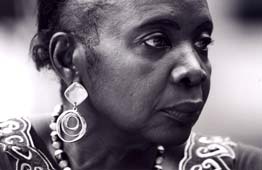
Aminata Sow Fall
- Senegal
- Zu Gast beim ilb: 2006
Aminata Sow Fall was born in Saint Louis, northern Senegal, in 1941, and hails from an ancient lineage. She studied Literature at the Sorbonne until 1970. After graduating, she worked as a French high school teacher in Dakar, wrote her first novels, and was swiftly promoted to leading administrative positions, often as the first woman to hold those posts. She was a member of the National Reform Commission for the Teaching of French, Director of the literature section of the Ministry of Culture as well as Director of the state-run Centre d’Etudes des Civilisations, which researches Senegal’s culture and oral literatures. Her role as a female pioneer was confirmed in 1985 when she was named the first woman president of Senegal’s Writers’ Association. Two years later she founded the Centre Africain d’Animation et d’Echanges Culturels, an independent organisation which promotes young writers through literature festivals, competitions and seminars and publishes them in »Edition Khoudia«, an affiliated publishing house.
The novels written by this grande dame of African literature are equally marked by her commitment to social issues. Sow Fall portrays modern Senegalese society in a critical light: greed and abuse of power among the postcolonial elite, the uncritical adoption of Western ways of life, and the disregard for their own culture. In fablelike, realistic stories written with situational comedy and irony she shows how instances of social alienation in Senegal can be traced back to a denial of one’s own roots. Sow Fall’s most famous novel, »La Grève des Bàttu« (1979; Eng. »The Beggars’ Strike«, 1981), tells the story of the banishment of beggars from Dakar and their cunning protest, a strike, which threatens to prevent the implementation of the law on giving alms. The book has been translated into eleven languages, and adapted for stage and screen in Africa, the United States and Europe. Her latest book to appear in Germany – also made into a film – is »The appeal of the arenas» (2001; OT: »L’appel des arènes«, 1982), a story of a generational conflict within an upper class family. A son’s interest in the traditions of his people is completely incomprehensible to his parents, who are subject to Western influences and focused on prosperity and career. In the end only the father succeeds in warily embracing his child and his own origins. Sow Fall also highlights the difficulties of cultural modernisation and a synthesis of both cultures in her account of a well-meaning monarch who in »L’Ex-Père de la nation»(1987; t: The nation’s former father figure) becomes a tyrant, as well as in her most recent work, »Festins de détresse« (2005; t: Feasts of distress).
The author has received prizes such as the Grand Prix Littéraire d’Afrique and the Prix International Alioune Diop. She has also been awarded an honorary doctorate by Mount Holyoke College in South Hadley, Massachussetts. She is a member of several orders, among them the Ordre de Mérite. The mother of four lives in Dakar.
© internationales literaturfestival berlin
Der Streik der Bettler
Lamuv
Göttingen, 1996
[Ü: Caroline Gutberlet]
Der Sonnenpräsident
Lamuv
Göttingen, 1997
[Ü: Cornelia Panzacchi]
Die wundersame Verwandlung des Bakar Diop
Lamuv
Göttingen, 1998
[Ü: Cornelia Panzacchi]
Douceurs du bercail
Nouvelles Éd. Ivoiriennes
Abidjan,1998
Le Jujubier du patriarche
Le Serpent à Plumes
Paris, 1999
Die Rückkehr der Trommeln
edition KAPPA
München, 2001
[Ü: Cornelia Panzacchi]
Un grain de vie et d’ésperance
Truffaut
Paris, 2002
Festins de détresse
Or des Fous
Nyons, 2005
